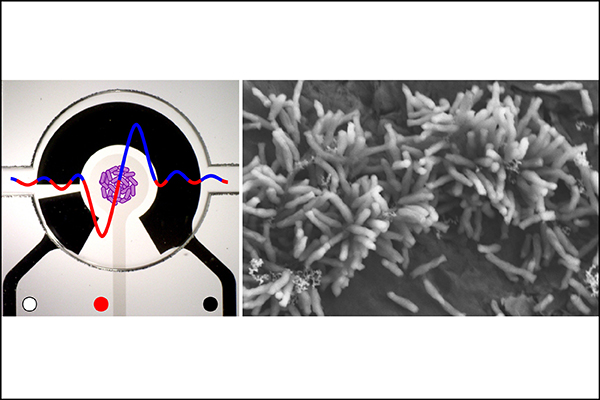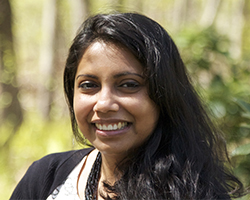Meacham, Bose receive university’s first DEPSCoR grant since 1996
They seek to understand extracellular electron uptake in bacteria using novel acoustic microfluidic devices

Mark Meacham and Arpita Bose at Washington University in St. Louis have received the university’s first Defense Established Program to Stimulate Competitive Research (DEPSCoR) award from the U.S. Department of Defense (DoD) since 1996.
The three-year, $600,000 award is among $10.2 million the DoD awarded to 17 collaborative teams in 37 states and U.S. territories. The program is designed to strengthen the basic research infrastructure at institutions of higher education in underutilized states and territories and to introduce potential researchers to the DoD’s research challenges and research ecosystem.
Meacham, assistant professor of mechanical engineering & materials science in the McKelvey School of Engineering, and Bose, associate professor of biology in the College of Arts & Sciences, will combine their expertise to understand extracellular electron uptake in bacteria using a combination of acoustic microfluidics and microscale electrochemistry. Bose studies microbial metabolisms and their influence on biogeochemical cycling. She has pioneered the fundamental understanding of extracellular electron uptake in microbes. Meacham creates novel microfluidic devices, including those that apply ultrasound for manipulation of fluids and particles, to investigate novel biological and energy systems. The two investigators have been collaborating for several years to develop a miniature version of an electrochemical cell to measure bacteria.
With the DEPSCoR funding, Meacham, Bose and members of their labs will seek ways to leverage different microfluidic approaches to answer fundamental questions about bacterial behavior.
“The neat thing about acoustics is that in addition to allowing more precise measurements at the microscale, when you incorporate an external force field, you can control aspects of the experiments without physically touching the cells,” Meacham said. “We will be testing the behavior of bacteria during exposure to acoustic fields."
Bose said this process of extracellular electron uptake, which occurs when microbes generate energy without soluble electron donors, is new in microbiology. Existing tools that have been used to study extracellular electron uptake are damaging to cells, and Meacham’s microfluidic acoustic devices are able to move the cells without damaging them.
“There are a lot of new questions we are asking, but to start our understanding, we had to have new tools,” Bose said.
Meacham and Bose admit the project carries some risk since the devices are difficult to develop and fabricate, which is in line with the DEPSCoR initiative. They are already working with the university’s Office of Technology Management to obtain a patent on their technology, which doctoral student Andreea Stoica and Karthikeyan Rengasamy, a staff scientist in Bose’s lab, have been working to perfect.
“We have a unique interdisciplinary approach, including measurements with acoustic control and biological experimentation that has the potential to improve knowledge of biology and physics with a heavy engineering component involving device fabrication and integration,” Meacham said.





